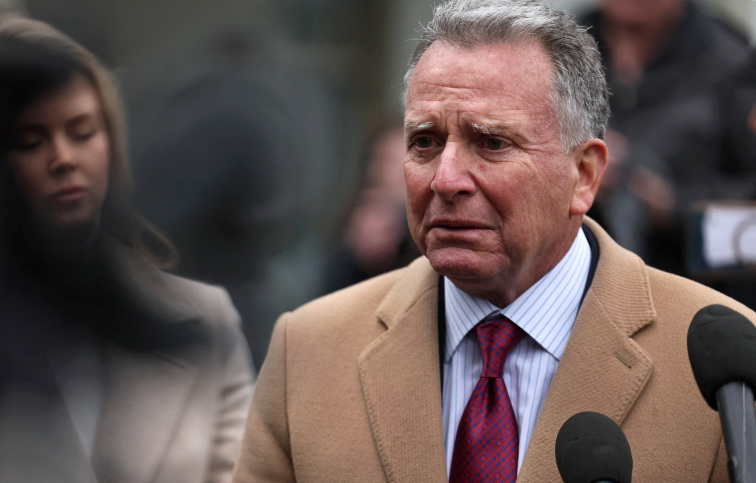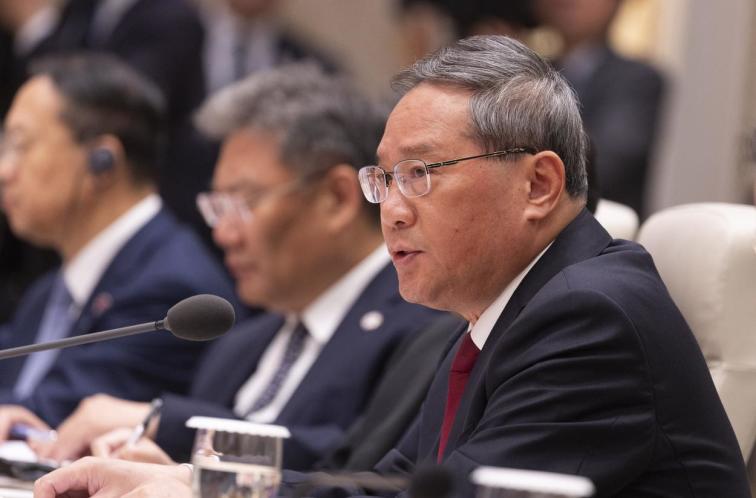Dark clouds hang over Tiananmen Square in Beijing. (Lintao Zhang/Getty Images)
[People News] On September 25, the 70th anniversary of the establishment of the Xinjiang Uygur Autonomous Region was celebrated in Urumqi. Although Xi Jinping, the General Secretary of the Communist Party, led a central delegation to the event, he was not accompanied by Zhang Youxia, the first vice-chairman of the Central Military Commission, nor did he deliver a speech at the conference. Additionally, he faced disrespect from two members of the Communist Party's Standing Committee, Wang Huning and Cai Qi. These various signs suggest that Xi's position within the Politburo has indeed changed.
Another point of interest is the nature of the congratulatory messages sent to Xinjiang by the Central Committee of the Communist Party, the Standing Committee of the National People's Congress, the State Council, the National Committee of the Chinese People's Political Consultative Conference, and the Central Military Commission prior to the celebration.
In the fourth paragraph of this year's congratulatory message summary, it states that the achievements of Xinjiang are 'the result of the strong leadership of the Party Central Committee and the previous party committees and governments of the Xinjiang Uygur Autonomous Region...' It also emphasises that only by adhering to the leadership of the Communist Party can Xinjiang achieve certain goals. Notably, this paragraph does not mention 'Xi Jinping' or 'the Party Central Committee with Xi at its core.'
The fifth paragraph outlines expectations for the coming years, reiterating the guidance of 'Xi Thought,' 'deeply implementing the spirit of the 20th National Congress of the Communist Party and the previous plenary sessions of the 20th Central Committee,' along with the standard loyalty phrase 'two four four two.' The concluding part includes slogan-like calls for unity around 'the Party Central Committee with Xi at its core.'
Overall, this year's congratulatory message appears to downplay Xi's status. Why do I say this?
Let’s first revisit the content of the congratulatory messages issued by these five highest party and government bodies during the 60th anniversary of the establishment of the Xinjiang Autonomous Region in 2015.
In summarising the past achievements of Xinjiang, the report emphasises that 'Xinjiang work is crucial to the overall situation,' and the Communist Party of China (CPC) 'has consistently placed it in a special and important strategic position.' It goes on to reference the 'three generations of central leadership collectives of the Party, with Mao, Deng, and Jiang at the core,' as well as 'the Party Central Committee led by Hu Jintao as General Secretary,' which made a series of significant decisions and policies. Since the 18th National Congress of the CPC, the Party Central Committee, under the leadership of General Secretary Xi Jinping, convened the second Central Xinjiang Work Symposium, further clarifying the direction for Xinjiang's development.'
Looking ahead, the report states, 'Guided by Deng Xiaoping Theory, the important thought of the 'Three Represents,' and the Scientific Outlook on Development, we will thoroughly study and implement the spirit of General Secretary Xi Jinping's series of important speeches,' and so forth. The concluding section also features similar slogan-like affirmations of commitment.
At that time, Xi Jinping had only been in power for a few years, and his foundation was not yet stable, as he faced constraints from the Jiang faction. Thus, the references to previous CPC leaders in the news were part of an established pattern. Following the 19th National Congress of the CPC, Xi consolidated his position as the 'supreme leader,' and the format of state media shifted to emphasise Xi himself while downplaying the previous party leaders.
For instance, during the 65th anniversary celebrations of the Xinjiang Autonomous Region in 2020, Xinjiang Secretary Chen Quanguo's speech repeatedly highlighted Xi Jinping, asserting that all achievements since the 18th National Congress of the CPC and the second Central Xinjiang Work Symposium were attributed not only to the CPC but also to the 'strong leadership of the Party Central Committee with Xi at its core,' among other acknowledgments.
Chen Huan emphasized the need to "steadfastly and unwaveringly advance towards victory in accordance with the direction guided by General Secretary Xi Jinping"; to "hold high the great banner of Xi Jinping's Thought on Socialism with Chinese Characteristics for a New Era," and to "deeply study, promote, and implement the spirit of the Third Central Xinjiang Work Symposium, especially the important speeches of General Secretary Xi Jinping." He also referenced the loyalty phrase "two four four two" among other points.
Unexpectedly, while Xi Jinping, who has directed the course for Xinjiang and whose speech was lauded as "marking a new historical starting point for Xinjiang work in the new era," has been noticeably downplayed in this year's congratulatory message. This observation, when connected to the unusual aspects of Xi's recent trip to Xinjiang, further supports the notion that Xi's position has indeed shifted.
In fact, the format of this year's congratulatory message resembles that of the 50th anniversary of the Xinjiang Autonomous Region in 2005. At that time, the congratulatory message did not mention Hu Jintao when summarising achievements, but only referred to Deng Xiaoping's theory, the "Three Represents," and Hu's Scientific Outlook on Development when looking ahead. The low profile can be attributed not only to Hu Jintao's own reserved nature but also to the significant constraints imposed by the Jiang faction on Hu and Wen, which made it difficult for Hu to assert dominance.
The return of this year's congratulatory message to standards seen twenty years ago raises the question: Does this suggest that Xi is currently facing constraints from the elders of the Communist Party, making it challenging for him to maintain absolute power?
(First published in People News) △











News magazine bootstrap themes!
I like this themes, fast loading and look profesional
Thank you Carlos!
You're welcome!
Please support me with give positive rating!
Yes Sure!